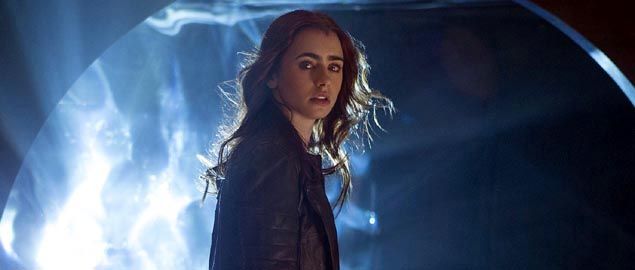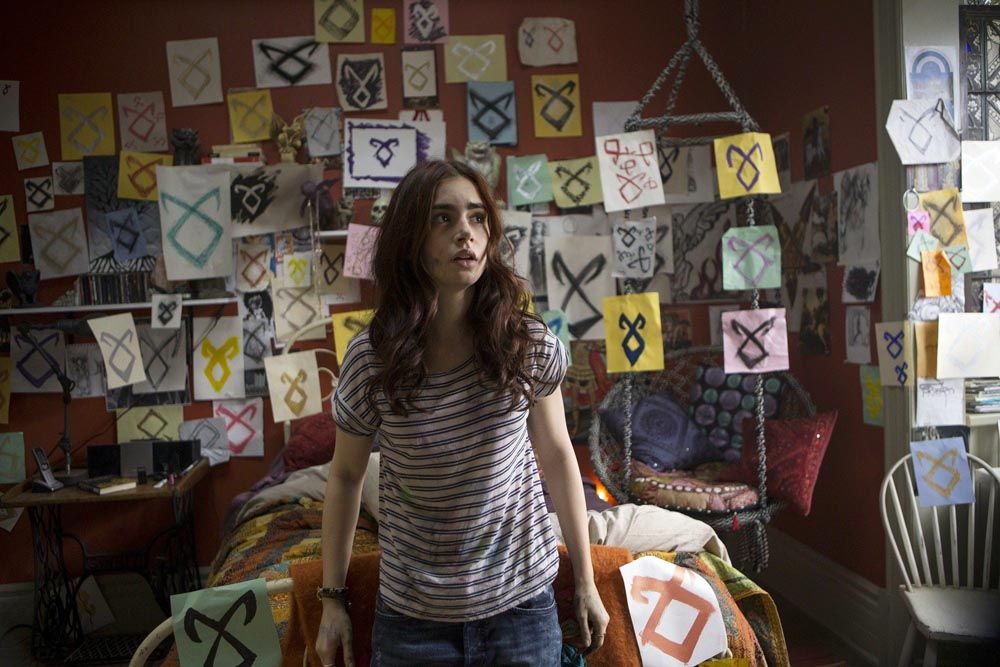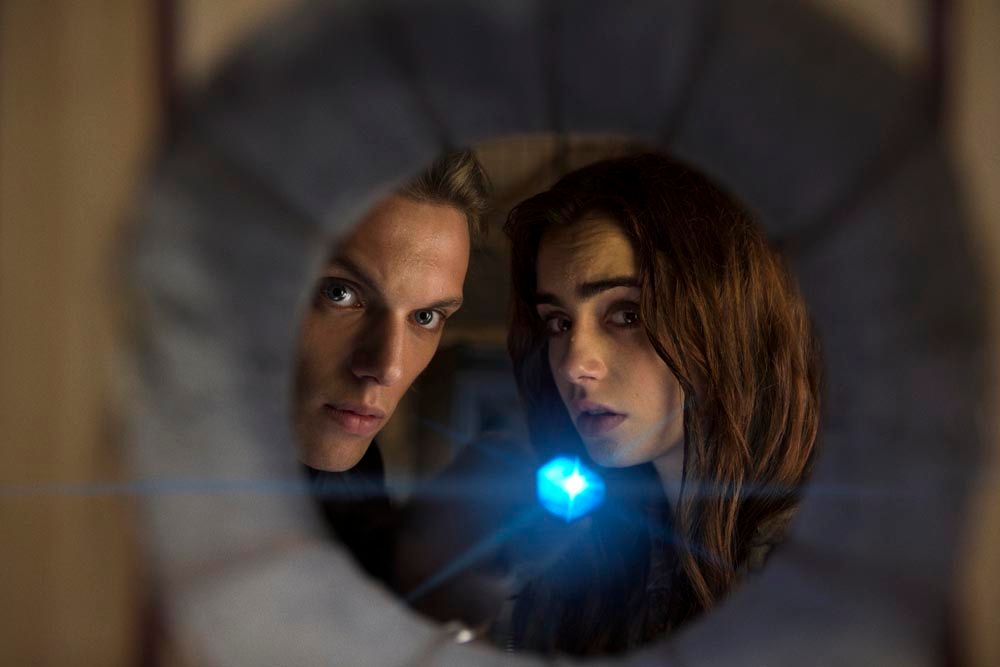It was just last year that Lily Collins broke through with her starring role in Tarsem Singh’s Mirror Mirror, but the 24-year-old wasted no time establishing a niche for herself as a strong, complex leading actress. Her latest big role is that of Clary, the protagonist in director Harald Zwart’s The Mortal Instruments: City of Bones, who discovers she plays an important part in a secret supernatural culture that lurks on the fringes of our own.
As Collins observes, the character exudes femininity and vulnerability, but Clary is far from a damsel in distress. Rather, she’s a strong-willed and self-possessed young woman who takes charge when her mother disappears, and she soon finds talents and strengths she never knew she had.
Spinoff Online recently sat down with Collins in Los Angeles, where she revealed her own excitement to see Cassandra Clare’s bestselling fantasy novels brought to the screen. Additionally, she talked about the character’s unique position in the young-adult market as a take-charge, formidable counterpart to her male co-stars, and dexterously talked around specifics when it came to making important but necessary changes to the source material.
Spinoff Online: The fans didn’t object to you taking the lead role, but did you have any trepidation about working on a project with such high expectations behind it?
Lily Collins: I was a fan of the books before I was cast, so I was aware of the series. But I was not aware of how massive the fandom was, and I’m not big on social media, so when I was cast and social media blew up, I had no idea how many people would be interested in the fact that I was cast. So the fact that everyone started then putting their opinions about casting, or saying “her hair is the wrong color,” I’m like, oh, my God – there’s so much to be said! I didn’t quite realize there were that many fans. But gratefully, no one objected to the point that some other cast members had with their casting. I think because I signed on first and it was at the beginning of the process, I adapted to this kind of fan response to everything that was announced in the now, I guess, three years since I got involved. It’s been like this labor of love kind of project. But I played Snow White, and obviously that’s a character that’s even more known worldwide for years, so playing another literary-heroine character that people already had a preconceived idea of was something I was somewhat used to. And I got to at least come to a place where I was able to separate myself as Lily the fan, Lily the actor and Lily as Lily. So it wasn’t as difficult to separate myself from that fan response, because there were already all of these comparisons I had dealt with before, so this time it just felt like, well, it’s going to happen every time.
How did you get the role in the first place?
I didn’t have to audition, actually, which is kind of the even crazier thing. I read this book, found out they were going to make it into a movie, and made all of the phone calls I could, sent out emails to my agents, and I was like, what’s going on with this? And it was at the time with the same director that I had just worked with on Priest, and it was at Sony/ Screen Gems. So it really was a lot of the same people involved, and it kind of organically happened for me and then I was involved in the casting process for other roles.
The series has a more sophisticated attitude about sexuality in general, having characters that are openly gay, etc. What concerns did you have about how that might be explored on screen?
I think it’s the first “love cube” – everyone kind of loves everyone in some weird way. But when I read the books, that’s what I loved the most – I loved Cassandra’s comedic undertones. I think that’s lacking in other teen franchises where if it ever gets to a point when an audience is going, “Oh, my God, this is so much fantasy,” we actually laugh along with the audience and crack a joke and go, OK, we’re not taking ourselves too seriously. I didn’t want to lose that, and that was what was great about Harald – when he came on, he was like, I love the comedy and I don’t want to lose that, because that’s what signifies Cassie’s story from other teen franchises. Also I thought it was really important about the gay characters; the thing about Alec, though, is that him being gay doesn’t define him. He’s a warrior, he’s one of the guys, and even though he doesn’t like me right off the bat, that could be for many reasons – I’m intruding on their lives, I’m coming in not knowing what I’m doing but trying to insert myself. It doesn’t matter that he has a thing for Jace, it’s just that he doesn’t like me. So the way Kevin played him and that he was written was not this caricature of a gay character; we didn’t want people to watch it and go, “Oh, he’s gay.” We wanted it to be part of his character, and have that be a proud aspect of his character, but not be just what his character is about.
And Magnus’ character as well, he’s incredibly important to the story throughout the books, and he is this rock-star, party-having, glitter-wearing guy – but then again, he’s an old soul, he’s extremely wise, he’s been around for hundreds of years, and he’s all-knowing. So again [his sexuality] is not a defining characteristic, but is something very interesting that many other franchises haven’t dealt with. I’ve grown up with gay uncles, people that are my family, that I really responded so much to certain things in this movie. Like my mom and I are best friends, so the fact that finally a movie is showing a relationship between mom and daughter in a way that is like a daughter doing anything to get her mom back as opposed to a parent trying to get her kid back or a catty relationship – when push comes to shove, she’ll go after her mom for anything. So there were these different things in the story that I knew Harald wouldn’t want to get rid of, because he was in it for the characters and the emotion, not the CGI. And that I think is what separates this – you could lose the CGI, the green screen, and still have the same story.
What sort of journey do you think this character goes through? She seems more confident and self-possessed than a lot of the heroines of stories like these.
I think Clary has never had any doubt about her morals – like, her best friend is Simon, and there’s not a mean bone in his body. They love each other for who they are. And she’s always thought of herself as normal – she’s into what she’s into, she dresses how she dresses, she’s not an outsider, she’s not emo, she’s not trying to be anything other than just Clary. And she didn’t seek out any of this stuff to happen to her; I think she would have been just fine the way that she was, living her life. She’s very opinionated and passionate, and compassionate, and no matter where she is in this reality or this fantasy world, she always is able to voice her opinions. Yes, she does break down at that one point in the rain; we had to show a vulnerable point in her journey where she just breaks down, because otherwise, how unbelievable is it that a girl who’s so opinionated is all of a sudden see what she sees and then just go along with this guy. That’s not real. It’s OK to have a moment of weakness, and it’s OK to be completely confused. But ultimately, she doesn’t have a choice: If she wants to continue on to try to find her mom, her only choice is to follow this guy.
But she never victimizes herself, and she doesn’t allow her environment to define her. So even though Isabelle dresses her up in those awkward clothes, it still doesn’t define her – like when she goes to save Simon and goes, “those damn boots.” She kind of is one with the audience in that sense, and she’s constantly asking questions to the characters not in an expositional way, but in a way to be one with the audience. If no one knows what's going on, she goes, “Hold on, guys, I don’t really care about all of this that you’re saying. My mom’s missing, and that’s all that matters.” So I think her morals never change, but her openness changes to her new environment and her world, but she’s still Clary – and that’s what Jace loves about her, I think. It’s this like Katharine Hepburn-Spencer Tracy back and forth – finally, they found a competitor in one another. She doesn’t want to take his crap, and he doesn’t want to take hers, and she’ll fight back – but she still can be vulnerable and a girl.
As a fan, how did you feel about the changes they had to make in the process of adapting it for the screen?
Well, there were many incarnations of the script. The script that I first read is not the script that we ended with. We constantly had rewrites throughout the project. And the great thing about having Cassie [Clare] there was, like when Jamie and I read the ending, we had a major issue with it – so we went to Cassie, and Cassie agreed with some of the points that we had. She kind of rewrote it overnight, and we brought it to them and said, what about this? It was a big collaboration. But Jamie and I are so passionate about how certain things are handled at the end of the movie, because it’s very sensitive, because for fans that don’t know the movie or the books, they could be completely weirded out by [certain plot details] and it could be a turn off for parents to allow their kids to see it. But I think because of the newfound love for teen franchises, and the obsession with them, introducing certain [sexual] topics isn’t something you normally do. So we had to be sensitive to introduce certain things from the books, but also realize we may not get to do a sequel, so we have to wrap certain things up in the first one so it doesn’t leave you hanging too much. But then we got greenlit for a second one so we get to explore things more, but there was that fine line of wanting audiences to go, “no, no, we don’t want that to be true!” But also that, “oh, maybe it’s not,” so at least it doesn’t feel really wrong.
The Mortal Instruments: City of Bones opens today.



